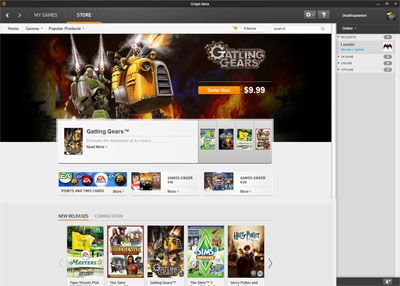- Qualcomm Launches Snapdragon 4 Gen 2 Mobile Platform
- AMD Launches Ryzen PRO 7000 Series Mobile & Desktop Platform
- Intel Launches Sleek Single-Slot Arc Pro A60 Workstation Graphics Card
- NVIDIA Announces Latest Ada Lovelace Additions: GeForce RTX 4060 Ti & RTX 4060
- Maxon Redshift With AMD Radeon GPU Rendering Support Now Available
EA’s Origin Service to Soon Introduce Third-Party Titles
Since its launch earlier this summer, EA’s Origin digital game store has been met with some rather vocal reaction. If Web forums and comment sections are to be believed, Origin is the worst piece of software that could ever grace our PC. But if there’s one valid complaint I can agree with, it has to do with its selection. If Origin has Steam et al in its sights, the selection has to improve.
Up to now, Origin has only had its digital shelves stocked with EA titles (including EA Sports), and for that reason in particular, the selection is limited. Helping things is the fact that some older titles are available, but not to the extent we’d expect (EA: given the option, I’d purchase all old Need for Speed titles digitally).

Though EA produces a far greater number of titles than Valve, imagine if the latter decided to skimp out on third-party support at the get-go. Would it be where it is today? Not likely. Competition would have moved in faster, and it could have been far more successful. In today’s digital game store landscape, starting off slow and small isn’t what will capture gamers.
EA’s CFO Eric Brown, at a recent conference, stated that third-party support would be coming to Origin, though no names have been dropped. It could be assumed that most big and small publishers would be open to having their games offered on Origin, but the decider will be EA’s contracts. If for some reason they favor a publisher less than Valve’s contracts do, EA may still find itself struggling for growth.
Speaking of, Mr. Brown at the same conference touted some impressive numbers. Since its introduction, Origin has been installed by 3.9 million users, and ‘freemium’ games Battlefield Play4Free (1.4 million players) and Dragon Age Legends (600,000 players) have proven to be quite successful.
Still, as successful as those free games are, EA will have a lot of mending and future-changes to make before gamers start to jump on the service en masse. Valve’s Steam platform is not going to be an easy Goliath to take down, so the sooner EA corrects what it needs to, the better.




